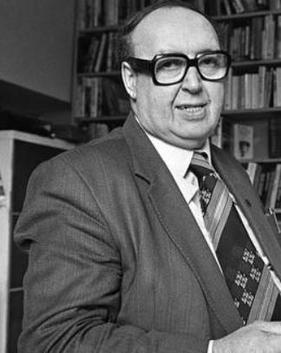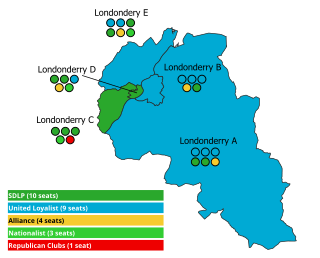
John Hume was an Irish nationalist politician in Northern Ireland and a Nobel Peace Prize laureate. A founder and leader of the Social Democratic and Labour Party, Hume served in the Northern Ireland Parliament; the Northern Ireland Assembly including, in 1974, its first power-sharing executive; the European Parliament and the United Kingdom Parliament. Seeking an accommodation between Irish nationalism and Ulster unionism, and soliciting American support, he was both critical of British government policy in Northern Ireland and opposed to the republican embrace of "armed struggle". In their 1998 citation, the Norwegian Nobel Committee recognised Hume as an architect of the Good Friday Agreement. For himself, Hume wished to be remembered as having been, in his earlier years, a pioneer of the credit union movement.
The Social Democratic and Labour Party is a social-democratic and Irish nationalist political party in Northern Ireland. The SDLP currently has seven members in the Northern Ireland Assembly (MLAs) and two members of Parliament (MPs) in the House of Commons of the United Kingdom.

The 2003 Northern Ireland Assembly election was held on Wednesday, 26 November 2003, after being suspended for just over a year. It was the second election to take place since the devolved assembly was established in 1998. Each of Northern Ireland's eighteen Westminster Parliamentary constituencies elected six members by single transferable vote, giving a total of 108 Members of the Legislative Assembly (MLAs). The election was contested by 18 parties and many independent candidates.

Mark Durkan is a retired Irish nationalist politician from Northern Ireland. Durkan was the deputy First Minister of Northern Ireland from November 2001 to October 2002, and the Leader of the Social Democratic and Labour Party (SDLP) from 2001 to 2010. He contested the Dublin constituency for Fine Gael at the 2019 European Parliament election.
The Northern Ireland Labour Party (NILP) was a political party in Northern Ireland which operated from 1924 until 1987.
Labour – Federation of Labour Groups is the formally registered name of a collection of political organisations in Northern Ireland who aspire to become part of the Labour Party of Great Britain.
The Nationalist Party was a term commonly used to describe a number of parliamentary political parties and constituency organisations supportive of Home Rule for Ireland from 1874 to 1922. It was also the name of the main Irish nationalist Nationalist Party in Northern Ireland from 1921 to 1978.

Patrick Joseph "Paddy" Devlin was an Irish socialist, labour and civil rights activist and writer. He was a founding member of the Social Democratic and Labour Party (SDLP), a former Stormont MP, and a member of the 1974 Power Sharing Executive.
Ivan Averill Cooper was a nationalist politician from Northern Ireland. He was a member of the Parliament of Northern Ireland and a founding member of the Social Democratic and Labour Party (SDLP). He is best known for leading the civil rights march on 30 January 1972 that developed into the Bloody Sunday massacre.
The Irish Independence Party (IIP) was a nationalist political party in Northern Ireland, founded in October 1977 by Frank McManus and Fergus McAteer. The party was effectively a merger of Unity and the Nationalist Party, as the bulk of activists and councillors from the two movements joined IIP. However several independent councillors also joined the party. It was boosted in the late 1970s by the defection of a prominent Protestant Larne Social Democratic and Labour Party (SDLP) councillor, John Turnley, later the party chairman, who was killed in 1980 in Carnlough, County Antrim, by an attack claimed by the Ulster Defence Association.
The Irish Anti-Partition League (APL) was a political organisation based in Northern Ireland which campaigned for a united Ireland from 1945 to 1958. The organisation aimed to unite Irish nationalists, filling the void left by nationalist groups that had become inactive in the decade prior. At its peak, the League had around 3,500 members. There was significant internal debate about whether candidates should participate in the British Parliament. In the mid-1950s, most abstentionists had left the organisation. Dwindling membership meant that by 1956, no candidates were nominated for committee elections. The organisation remained inactive until 1958, when a final meeting was held to distribute remaining funds. The League was succeeded by National Unity in 1959.

The Belfast South by-election was held on 4 March 1982 following the death of Robert Bradford, Ulster Unionist Party (UUP) Member of Parliament for Belfast South.
Helen Quigley is a former Irish Social Democratic and Labour Party politician from Derry in Northern Ireland.
The Nationalist Party was the continuation of the Irish Parliamentary Party (IPP), and was formed after the partition of Ireland, by the Northern Ireland-based members of the IPP.

Conall McDevitt is an Irish nationalist, and former member of the SDLP. He also served as the Social Democratic and Labour Party (SDLP) spokesman on Health, Social Services and Public safety and Policing, and was appointed to the Policing Board in May 2011.
Jonathan Stephenson was an Irish nationalist politician in Northern Ireland who was the chairman of the Social Democratic and Labour Party (SDLP) from 1995 to 1998, and a Belfast City Councillor for Castle from 1993 until 1997.
National Unity was an Irish nationalist political study group in Northern Ireland.
John Bernard Caraher, known as Ben Caraher, was a politician in Northern Ireland.
The Labour Party in Northern Ireland is the UK Labour Party's regional constituency organisation that operates in Northern Ireland. The Labour Party is not a registered political party in Northern Ireland and does not currently contest elections.

The 1973 Londonderry City Council election took place on 30 May 1973 to elect members of Londonderry City Council in Northern Ireland. This was on the same day as other Northern Irish local elections. The campaign was significant in that, following changes to the election process and districts, Irish nationalist parties were able to take control of the council for the first time.







